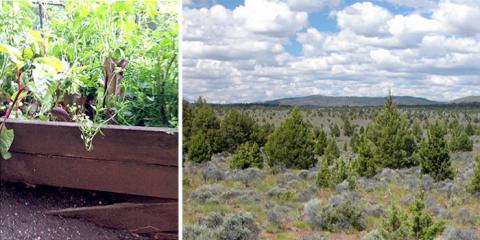Western juniper: A big problem with a great solution
July 29, 2014
My wife and I grow tomatoes, lettuce, peppers and other salad greens in raised beds that we built 12 years ago. We built the beds using untreated western redcedar. Today those cedar beds are beginning to fall apart from rot.
At the time we believed cedar was the best choice, and perhaps it was at the time – but today we think juniper may be the wiser choice for several reasons. And those reasons stretch well beyond the fact that juniper is highly rot-resistant.
The Western Juniper Utilization Group, which is managed by Sustainable Northwest, recently produced a great video on juniper that can explain it far better than I can, and I encourage you to view it.
Juniper is a native species that once was held in check by regular fire on the high desert. In 1935 it was estimated that Oregon had 600,000 acres of juniper, but today it is somewhere between 6 and 10 million acres.
Each juniper can use 35 gallons of water per day, which can severely restrict free-flowing water where the tree grows in abundance. It also out-competes sagebrush, leaving troubled species such as the western sage grouse without suitable habitat. Areas over-stocked with juniper also severely impact grazing lands.
This so-called “water thief” is literally a growing problem with multiple consequences.
That’s where the Western Juniper Utilization Group, an Oregon Solutions project, comes in. Since getting started in 2011, the group has begun to build a commercial supply chain that begins with removal of juniper from the high desert, involves small-scale milling operations, and enlists transportation networks to bring products made from juniper to market.
Building markets for juniper products is a challenge, but one on which the group has made headway. It can be turned into lumber – which I plan to use to replace my rotting raised beds – but it can also be used for making any wood product such as furniture, cabinets, paneling and logs used in homebuilding. Fence posts are a long-time use, but more recently juniper timbers have proved useful for building vineyard trellises, too.
If you’d like to evaluate juniper as a building product, consider visiting Sustainable Northwest Wood, a for-profit subsidiary of Sustainable Northwest in Portland.
Now, I gotta get started replacing those raised beds.
Dave Kvamme
Director of Communications
